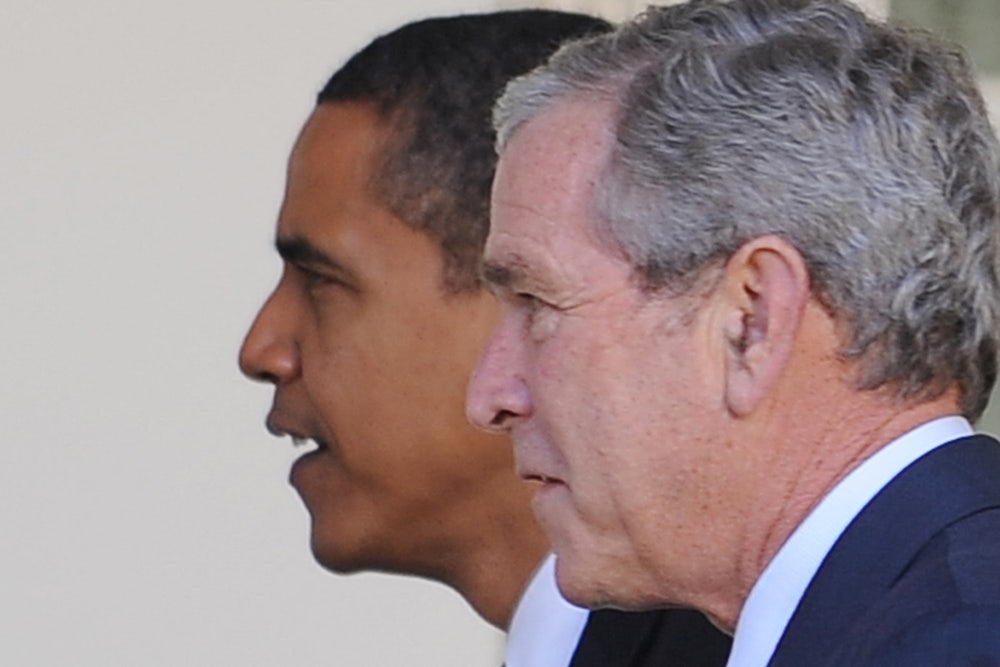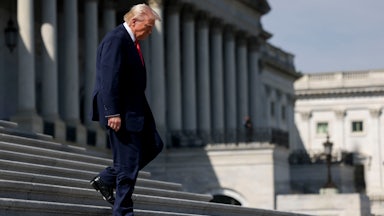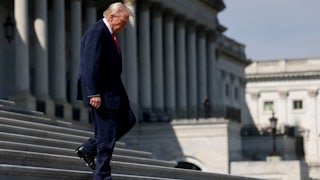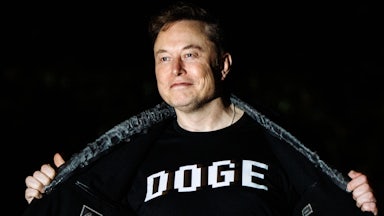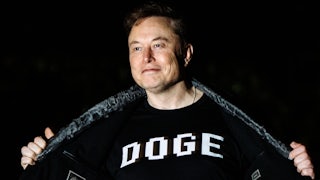As far as many members of Generation Z are concerned, the future does not look as rosy as the past their parents inherited. Their youth was marked by a series of dramatic—even traumatizing—events: the onset of the Great Recession in 2008; a spike in mass shootings, including school shootings; an increase in political polarization; a reckoning over racial violence; an uptick in severe weather events exacerbated by climate change; and the Covid-19 pandemic, to name just a few crises.
The general pessimism of Generation Z—who were born between 1997 and 2012—has given rise to an ascendant phenomenon: an emerging sense of nostalgia for a time before the struggles of their own youth. This widespread generational wistfulness for what many believe to be a more innocent era may in turn be affecting American politics and culture.
“One thing we can say for sure about Gen Z is that they’re less likely than their parents and grandparents [to] do as well as past generations,” said Melissa Deckman, the CEO of the Public Religion Research Institute, or PRRI, who has written a book on the political views of Gen Z Americans. “Looking back nostalgically is probably a way to deal with the reality that they face.”
It’s common for newer generations to adopt the fashion and trends of previous ones; young people today wear the same style of low-rise jeans that were popular among teenagers in the 2000s, and catch up with turn-of-the-millennium shows like Friends and Sex and the City on streaming services. But for Gen Zers, this nostalgia could extend beyond culture to a longing for what they perceive as a simpler time in politics. It may translate into a vague yearning for a perceived post-9/11 American unity, or the remembered prosperity of the 1980s and 1990s. The jingoism of the early 2000s, or the strain of social conservatism in the Reagan and Clinton eras, is not as relevant as the sense that these time periods held more hope for young Americans.
“They’re longing for a time period that they personally don’t necessarily remember,” said Rachel Janfaza, a reporter who writes a newsletter on youth politics and culture, and a member of Generation Z herself. In listening sessions with young people, Janfaza has heard Gen Zers of all political affiliations express admiration for former President Barack Obama—whose rise from sudden fame at the 2004 Democratic National Convention to his election as president was a full-blown 2000s phenomenon—as an ideal political candidate.
“They often think back to the Obama days as a time when things seemed more simple. Whether or not that was actually the case, I don’t know if they understand or have thoughts around that,” said Janfaza, who recently wrote a newsletter article on the power of nostalgia among Gen Zers. The oldest members of Gen Z would have been entering middle school when he was elected; the youngest, not even born when he took office. As such, they might not personally remember the backlash to Obama’s election, crystallized in the ascension of the Tea Party movement. Older Gen Zers were able to vote for the first time in 2016, and so have never participated in a presidential election that did not include Donald Trump at the top of the ticket.
Expressions of nostalgia cut across party lines, continued Janfaza. Conservative-leaning young people may be more attracted to the tradwife and tradlife culture, a popular trend on TikTok and other social media sites that emphasizes traditional gender roles. But progressive Gen Zers also may yearn for what they see as a simpler time in the past, particularly when they see the American dream as an artifact of a previous age.
“The prospect of one day owning a home just feels nearly impossible for many members of Gen Z, and so they often look back and romanticize the time, perhaps in their parents’ generation, when it was attainable to own a home,” said Janfaza.
This general dissatisfaction with the current economic and political status quo, and longing for an easier past, may have contributed to Trump’s strength among young voters in 2024. According to exit polling, former Vice President Kamala Harris only received 54 percent support from young voters, as compared to the more than 60 percent obtained by every other Democratic presidential candidate since 2008.
There were clear cleavages along racial, gender, and education lines: According to postelection polling by the Center for Information and Research on Civic Learning and Engagement at Tufts University, Trump obtained support from a majority of young men, young white people, and non-college-educated young people ages 18 to 29 years old. However, fewer young people voted in the 2024 presidential election as compared to 2020, indicating a level of dissatisfaction with both of the candidates.
Young men may also be yearning for a past that enforced traditional gender roles. Recent polling by PRRI found that 57 percent of young men aged 18 to 29 believed that society has become too soft and feminine, an increase from 42 percent in 2016. Forty-eight percent agreed that “society is better off when men and women stick to the jobs and tasks they are naturally suited for,” as compared to 38 percent who said the same in 2016.
Young men are plagued by anxiety about their future and their economic status, and have trended toward the Republican Party because they view it as being “stronger” than the Democratic Party, said John Della Volpe, director of polling at the Harvard Kennedy School Institute of Politics, who has written a book on Gen Z political participation. Their sense of dissatisfaction is amplified by social media, where they see others on TikTok living their “best life,” which leads to them questioning their own self-worth, he continued. (Relatedly, many of the proponents of tradwife philosophy on social media are related to wealth, presenting a version of reality that would still be unattainable to most young people.)
Deckman added that there has been a “loss of status” for young men, particularly non-college-educated young men, who also feel as if they have been personally targeted by perceived Democratic emphasis on “toxic masculinity.” Meanwhile, increasingly popular conservative podcasters and public figures present a version of masculinity where they are more in control of their role in society.
For some young people, a vote for Trump may have been in itself an expression of nostalgia. Janfaza noted that for members of Gen Z who were too young to vote in 2016 and 2020, a return to Trump would harken back to an earlier time in their lives, when they were children or teenagers: a period prior to the pandemic and before they were subjected to the cares and expectations of adulthood. Trump’s platform incorporates nostalgia with his promise to “Make America Great Again”; a pledge perhaps designed to appeal to older generations, but which also resonates with younger ones who feel as if they have never experienced a time when America was great.
“Across party lines—from the fixation with tradlife culture to feeling like the American dream is a relic of the past—it really does show that this is not a partisan issue, but that young people writ large like to go back to a time period that they believe was better, safer, kinder, and perhaps more prosperous than the one we’re currently living in,” Janfaza said.
Even so, there’s a certain tension that exists within Gen Z’s nostalgia. Some may long for the simplicity of an era that was led by older generations, but they also largely believe that the country’s biggest problems cannot be solved until those same older generations are no longer in power. They are distrustful of institutions, but across party lines, they believe that the role of government should be to help people. Della Volpe cited focus groups he held with young Republicans in Georgia last year, where participants surprised him with their belief that the government should invest in strengthening infrastructure and improving access to health care.
“Younger people still understand the importance of robust governments because of the systemic challenges that we face. They don’t necessarily trust the way in which capitalism is practiced today; there’s growing concern about the billionaire class and tech oligarchy that we see today,” said Della Volpe.
Even though Gen Zers may watch tradwife influencers on TikTok, the majority don’t necessarily want to return to a more socially conservative era. According to the 2024 American Values survey by PRRI, 54 percent of Gen Zers believe that American culture and way of life has mostly changed for the better since the 1950s, the largest percentage of any generation. While Deckman said there was clear evidence of a “conservatizing trend” among young men in particular, it had not necessarily cemented into hard fact. She noted that young men are still largely supportive of abortion rights and same-sex marriage, and that the majority do not identify with the Republican Party. Like many of the older adults who voted for Trump, young people who supported him “often are not, in fact, paying a lot of attention to news and policies,” said Deckman.
Given the lower voter turnout among young voters in 2024 compared to 2020, the overwhelming trend may not be young people shifting to the right, but continuing their march to disillusionment, which in turn instills the sense that a prior era included all of the stability they now lack. If politicians want to address the concerns of Gen Z in the future, they need to acknowledge “the elephant in the room,” said Janfaza.
“They need to address the fact that young people are nostalgic for the past, rather than just talk about the future,” Janfaza said. “Instead of just pretending like everything is OK, I think it’s really important for politicians to engage with and listen to young people’s concerns and address them appropriately before talking about the future.”
